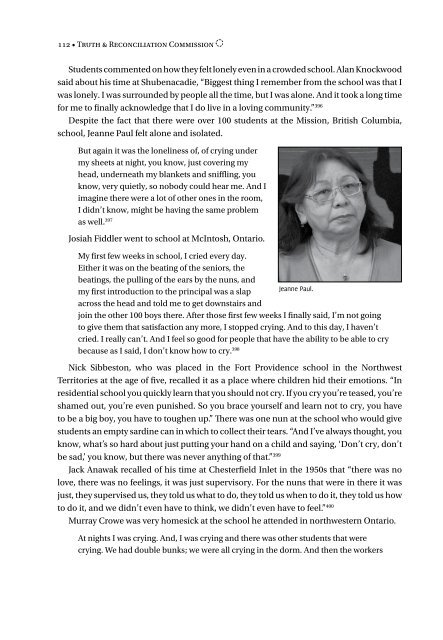The Survivors Speak
1MB8J05
1MB8J05
Create successful ePaper yourself
Turn your PDF publications into a flip-book with our unique Google optimized e-Paper software.
112 • Truth & Reconciliation Commission<br />
Students commented on how they felt lonely even in a crowded school. Alan Knockwood<br />
said about his time at Shubenacadie, “Biggest thing I remember from the school was that I<br />
was lonely. I was surrounded by people all the time, but I was alone. And it took a long time<br />
for me to finally acknowledge that I do live in a loving community.” 396<br />
Despite the fact that there were over 100 students at the Mission, British Columbia,<br />
school, Jeanne Paul felt alone and isolated.<br />
But again it was the loneliness of, of crying under<br />
my sheets at night, you know, just covering my<br />
head, underneath my blankets and sniffling, you<br />
know, very quietly, so nobody could hear me. And I<br />
imagine there were a lot of other ones in the room,<br />
I didn’t know, might be having the same problem<br />
as well. 397<br />
Josiah Fiddler went to school at McIntosh, Ontario.<br />
My first few weeks in school, I cried every day.<br />
Either it was on the beating of the seniors, the<br />
beatings, the pulling of the ears by the nuns, and<br />
my first introduction to the principal was a slap Jeanne Paul.<br />
across the head and told me to get downstairs and<br />
join the other 100 boys there. After those first few weeks I finally said, I’m not going<br />
to give them that satisfaction any more, I stopped crying. And to this day, I haven’t<br />
cried. I really can’t. And I feel so good for people that have the ability to be able to cry<br />
because as I said, I don’t know how to cry. 398<br />
Nick Sibbeston, who was placed in the Fort Providence school in the Northwest<br />
Territories at the age of five, recalled it as a place where children hid their emotions. “In<br />
residential school you quickly learn that you should not cry. If you cry you’re teased, you’re<br />
shamed out, you’re even punished. So you brace yourself and learn not to cry, you have<br />
to be a big boy, you have to toughen up.” <strong>The</strong>re was one nun at the school who would give<br />
students an empty sardine can in which to collect their tears. “And I’ve always thought, you<br />
know, what’s so hard about just putting your hand on a child and saying, ‘Don’t cry, don’t<br />
be sad,’ you know, but there was never anything of that.” 399<br />
Jack Anawak recalled of his time at Chesterfield Inlet in the 1950s that “there was no<br />
love, there was no feelings, it was just supervisory. For the nuns that were in there it was<br />
just, they supervised us, they told us what to do, they told us when to do it, they told us how<br />
to do it, and we didn’t even have to think, we didn’t even have to feel.” 400<br />
Murray Crowe was very homesick at the school he attended in northwestern Ontario.<br />
At nights I was crying. And, I was crying and there was other students that were<br />
crying. We had double bunks; we were all crying in the dorm. And then the workers


